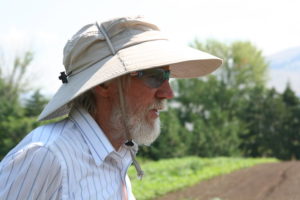
Doug Baty is one of the owners and operators of Wild Plum Farm, an organic vegetable and seed farm. Doug was one of five farm partners collaborating with OSA on a Montana Department of Agriculture Specialty Crop Block Grant focused on seed economics. The result of that project is this Seed Economics Toolkit. This article is based on an interview between OSA and Doug following the conclusion of that project.
Doug Baty traces his agricultural heritage in Northwestern Montana back over a century. In 1910, his grandparents came to the Flathead Indian Reservation as homesteaders to work the land now known as Wild Plum Farm.
Doug and his wife, Antje Baty, had been subsistence farming for a decade when the opportunity arose to purchase Doug’s grandparent’s farm, which had been sold in the interim. “Farming was the only way we knew to make a living,” Doug said.
The Batys went to work creating their business. Interworking production of organic seed and vegetables account for five of the 280 total acres at Wild Plum Farm, the rest of which Doug leases to cattle farmers.
When asked about his reason for saving seed, Doug explained that he enjoys “being involved with the entire life cycle of the plant” and that he is committed to stewarding his favorite varieties. “Most small scale seed saving is not difficult, and it’s really satisfying” he said.
With many years of practice, Doug decided to grow seed professionally. Reflecting on his beginnings in the seed industry, Doug credits his success to his relationships at a local seed company, Garden City Seeds. “We knew the people at Garden City, so it wasn’t as intimidating as starting out at a big company.”
During this time, Doug began growing Painted Mountain corn for Montana corn breeder, Dave Christensen. Painted Mountain is a flour corn variety which is descended from cultivars grown by First Nations farmers and early homesteaders in the harsh Rocky Mountain climate. Contracts with Johnny’s Selected Seeds, Baker Creek Heirloom Seeds, High Mowing Organic Seed and Fedco were soon to follow.
Wild Plum Farm continues to grow corn. Notably, ‘Who Gets Kissed?’ sweet corn, an open-pollinated variety developed through a collaboration between farmers and breeders led by researchers at Organic Seed Alliance and the University of Wisconsin-Madison. This variety is bred specifically for its superior sweetness, ability to germinate in cool soils and disease resistant qualities. In recent years, Doug has contracted with High Mowing Organic Seed for up to 1500 lbs of ‘Who Gets Kissed?’ seed. Wild Plum also grows black turtle beans, beets, lettuce, amaranth and radish seed. Doug occasionally sells seed through the Triple Divide Organic Seed Cooperative.
When it comes to working with seed companies, Doug values consistency and transparency. Open communication about pricing has supported his lasting business relationships. “I think it’s best when seed companies view the growers as part of their company,” Doug explained.
Doug noted that seed contracts can, at times, feel like “a black box,” as compared with wholesale produce. It’s not always apparent from seed catalogues what percentage of the final price is paid to the grower. Doug has found sharing experiences with other seed growers to be useful for navigating seed company relations. “One way that OSA has been helpful is by encouraging farmers to communicate amongst themselves.”
However, profit is not the only factor affecting Doug’s decision to grow a seed crop. “At the end of the season, we ask ourselves, ‘Do we want to grow this crop again? Did it feed us in some meaningful way?’”
Also see:
Talking Seed Economics with Fresh Roots Farm
